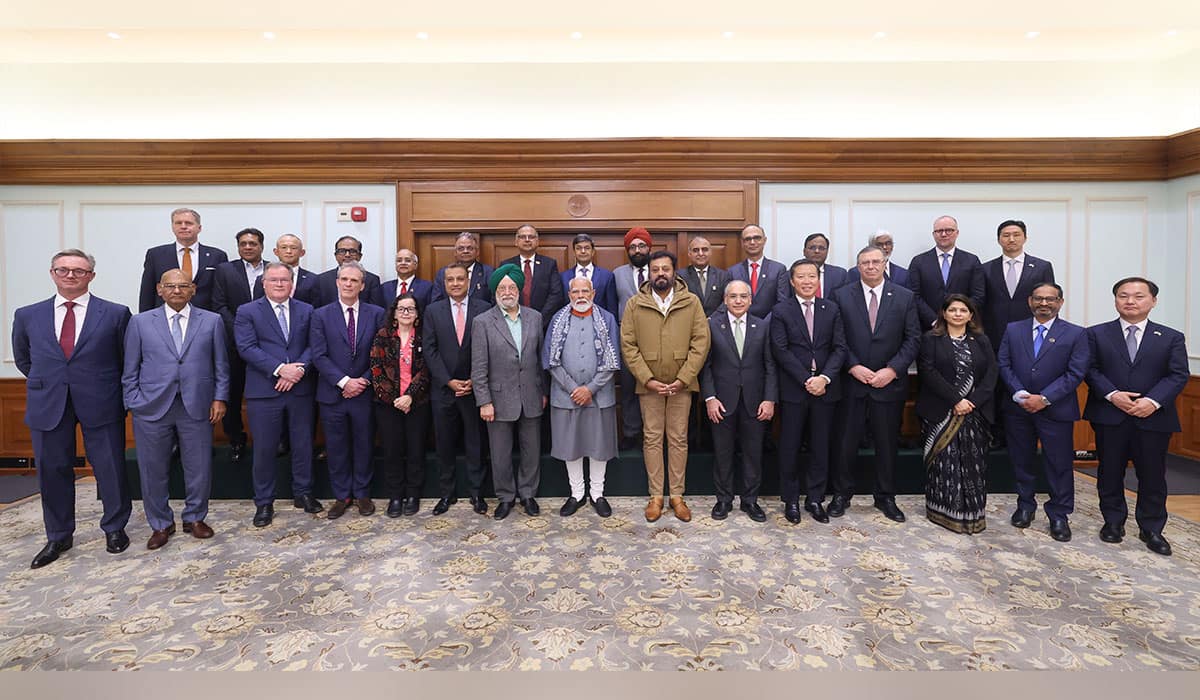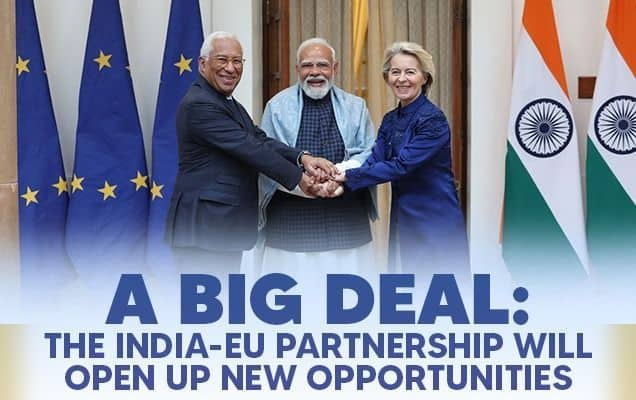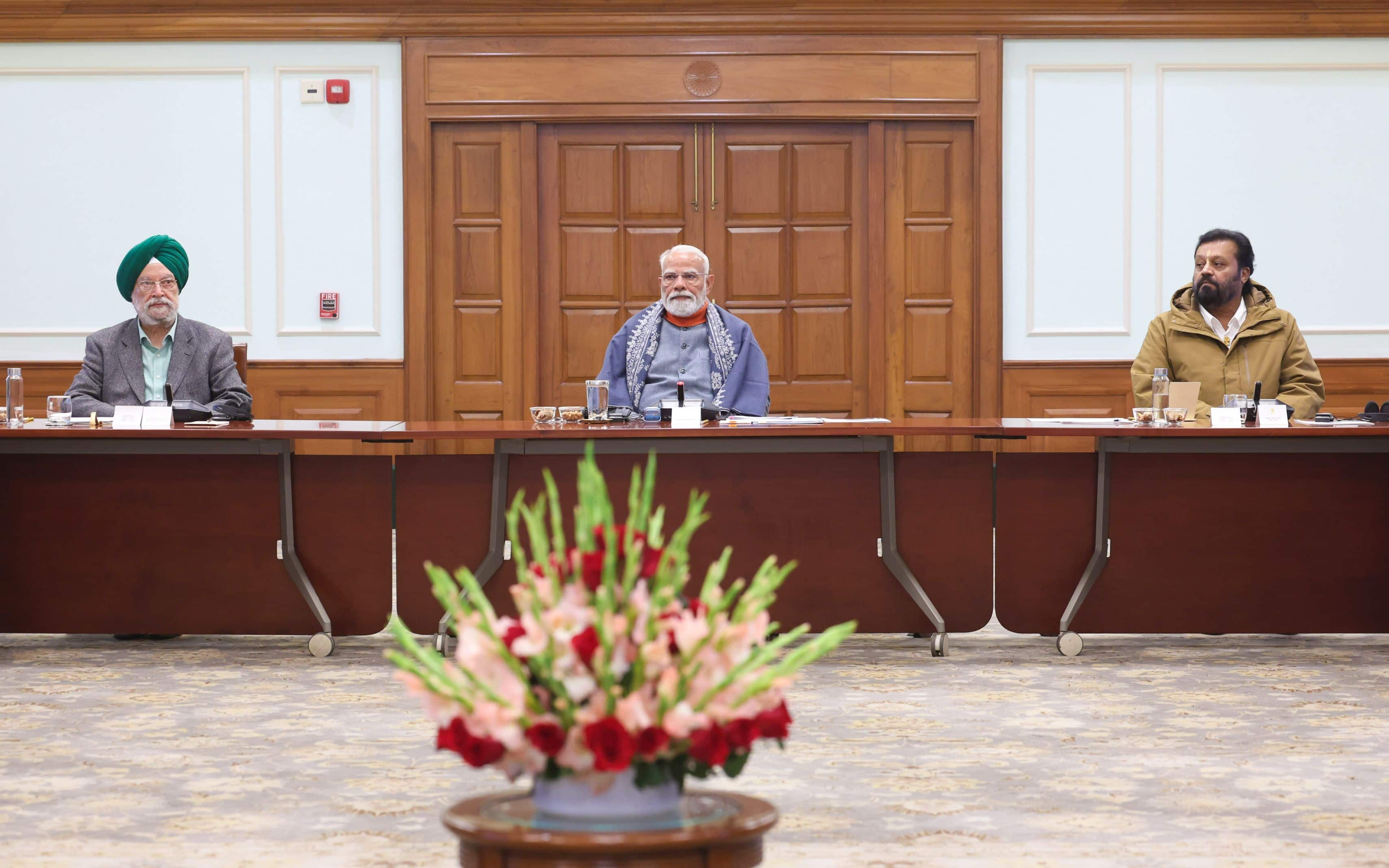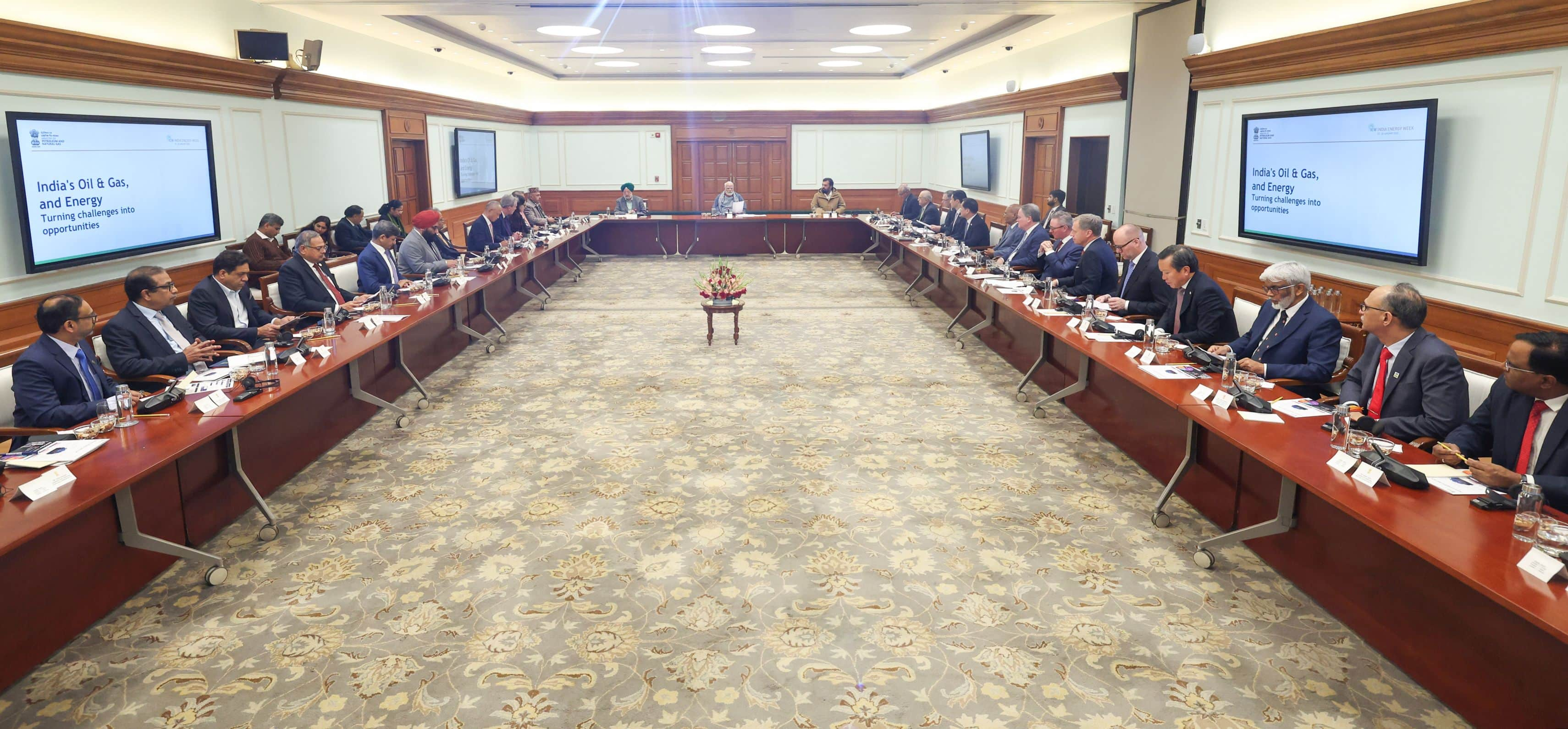At the outset, I will request all the youths to raise a slogan, you also say with me – I will say, Swami Vivekananda – you say, long live, long live.
Long live, long live Swami Vivekananda. Long live, long live Swami Vivekananda.
The country’s Education Minister Dr. Ramesh Pokhriyal Nishank ji, JNU Vice-Chancellor Professor Jagadesh Kumar ji, Pro Vice-Chancellor Professor R. P. Singh ji, Dr. Manoj Kumar ji, a JNU alumnus who gave shape to this event today, sculptor Shri Naresh Kumawat ji, faculty members from different places and all my young friends taking part in this function in a large number. I congratulate the JNU administration, all the teachers and students on this important occasion.
Friends,
Swami Vivekananda would say – “The secret behind faith in a statue is that you develop ‘vision of divinity’ from it.” I wish that this statue of Swamiji in JNU inspires everyone and fills them with energy. May this statue give that courage which Swami Vivekananda wanted to see in every person! This statue should teach compassion which is the mainstay of Swamiji's philosophy.
May this statue teach us the profound dedication towards the nation, the intense love for our country, which is the paramount message of Swamiji's life. May this statue inspire the country for the vision of oneness, which has been the inspiration of Swamiji’s thinking. May this statue inspire the country to move ahead with the vision of youth-led development, which has been the expectation of Swamiji. May this statue inspire us to realize Swamiji’s dream of a strong-prosperous India.
Friends,
It is not just a statue, but it symbolizes the height of the idea on which a hermit introduced India to the whole world. He had the profound knowledge of Vedanta. He had a vision. He knew what India could offer to the world. He spread India’s message of universal brotherhood in the world. He put forward the cultural splendor, ideas and traditions of India before the world in a glorious manner.
Can you imagine what did Swamiji spoke at the University of Michigan in America when there was disappointment and frustration all around and we were burdened in slavery? And he said it at the beginning of the last century. What did he say? The hermit of India made a declaration and also showcased the philosophy at the University of Michigan.
He said – This century belongs to you. These are his words at the beginning of the last century – “This century belongs to you, but the 21st century will certainly belong to India.” His words in the last century have proved prophetic. This is our responsibility to prove his words right in this century.
This statue is embodiment of the same self-confidence and spirit of Indians. This statue represents that philosophy which had awakened India which was forgetting its capability and identity due to the long period of slavery and had infused a new consciousness.

Friends,
Today, the country is moving ahead with the goal and resolve of a self-reliant India. Today, the idea of self-reliant India has become a part of the collective consciousness and aspirations of over 130 crore Indians. When we talk of self-reliant India, the goal is not only limited to physical or material self-reliance. The meaning of self-reliance is very comprehensive, its scope is very broad; it has depth as well as the pinnacle. A self-reliant nation is formed only when it becomes self-reliant in resources as well as in thinking and cultures.
Once somebody asked Swamiji abroad, why you don’t wear a dress in which you look gentleman. The reply of Swamiji underscores the depth of India's self-confidence and values. Swamiji replied to that gentleman earnestly that a tailor makes a gentleman in your culture, but in our culture, it is the character which judges the gentleman. This campus and youths like you develop the thought and culture of self-reliance.
Friends,
The youth of the country is the brand ambassador of Brand India across the world. Our youths represent the culture and traditions of India. Therefore, the expectation from you is not only to feel pride in the thousands of years of the ancient identity of India, but also to forge India’s new identity in the 21st century. To remember and tell what we have given to the world in the past enhances our self-confidence. We have to work for the future on the basis of this self-confidence. It is our collective responsibility to innovate what India would contribute to the world in the 21st century.
Friends,
Our young friends, who are an important link to the policy and planning of the country, must have a question regarding the meaning of self-reliance. Should it rest with oneself? We will get the answer to this also in the views of Swami Vivekananda. Once someone asked Swamiji whether the saint should not embrace all the countries instead of his own country? On this, Swamiji instinctively replied that how could the person, who can’t give affection and support to his mother, worry about the mothers of others? Therefore, our self-reliance is for the welfare of the entire humanity and we are showing this. The world has benefited whenever India’s strength has increased. The concept of India’s self-reliance encapsulates the welfare of the entire world.
Friends,
The unprecedented reforms being undertaken in every sector today are being done in a spirit of self-sufficiency. The people of the country have supported these reforms through vote also. All of you seriously analyse India's social and political system in JNU. Who knows better than you what used to be said about reforms in India? Is it not true that the good reforms were considered bad politics in India? So, how could good reforms become good politics?
You all at JNU should research this. On the basis of experience, I will definitely put one aspect before you. The resolve behind the number of reforms that are being made in the system today is to make India better in all respects. Intentions and integrity are sacred with reforms happening today. A safety net is being created before undertaking reforms today. The biggest premise of this safety net is trust. For example, let’s talk about pro-farmer reforms. For decades, the farmer was only a subject of political debate. There were barely any steps for his interests.
In the last 5-6 years, we have developed a safety net for farmers, like better infrastructure for irrigation, investment in modernization of mandis (markets), availability of urea, soil health cards, better seeds, crop insurance scheme, one-and-a-half time increase in MSP of the cost of the produce, E-Nam for online market or the direct assistance under the Prime Minister Samman Nidhi scheme. In the last few years, the MSP has been increased several times and record purchases were made from the farmers. We took forward the agro-reforms only after a safety net was woven around farmers and increase in their trust.
Earlier, we worked on the requirements of the farmers, and now work is being done to meet the aspirations of the farmers. Now farmers are getting more options in the market than traditional means. When there are more options, it increases competition among buyers and which is going to benefit the farmers. Reforms have now also cleared the way for farmers to become exporters directly through Farmers' Producers Organisations, i.e., FPOs.
Friends,
The same approach is being adopted in the case of reforms in the interest of the poor as well as farmers. For a long time, the poor were kept in slogans only. The fact was that no attempt was made to connect the poor of the country with the system. The poor were the most neglected, most unconnected and most financially excluded persons earlier. Now the poor are getting the facilities, like their own pucca house, toilet, electricity, gas, clean drinking water, digital banking, affordable mobile connectivity and a faster internet connection, as available to other citizens. This is the safety net woven around the poor, which is necessary for the flight of his aspirations.
Friends,
One more reform is the National Education Policy which directly affects the campuses of the country like JNU. The core values of the new National Education Policy are to create a young India with confidence, conviction and character. This was the vision of Swamiji. He wanted education in India to be self-reliant in all its forms.
Why should the youth not get the confidence at the beginning of school life which he gets after two-and-a-half decades of life? Why should the young energy be tied to bookish knowledge, to the shackles of streams, to mark sheet, degree, or diploma? The maximum focus of the new National Education Policy is on this. Inclusion is at the core of the new NEP. The spirit of this NEP is that language is just a medium and not a measure of knowledge. It has been ensured that the poorest of the poor, the daughters of the country, get the right to better education according to their needs and their convenience.
Friends,
Deciding on reforms is not enough in itself. What is more important is how we implement them in our lives. The meaningful change in our education system will also come fast with the new National Education Policy only when we, all of you will make sincere efforts. It is the highest responsibility of our teacher and intellectual class, in particular. Friends, there is a very popular spot in this JNU campus. Which spot is that? Sabarmati Dhaba? Is it not? And how many accounts of students are continuing there? I have heard that you go to this dhaba after your classes and debate and exchange ideas over tea and paranthas. If the stomach is full, then one enjoys debate also. To date, your hunger for ideas, debate and discussion used to be satiated in Sabarmati Dhaba. Now you have another place in the shadow of this statue of Swamiji.
Friends,
If there is one thing that has inflicted huge damage on our country’s democratic set-up, that is giving more importance to an ideology over national interest. Because my ideology says this, and I will think about the interest of the country with that thought is not the right approach. Friends, this is wrong. Everyone takes pride in his ideology. This is natural. But, still our ideology in matters of national interest should reflect with the nation and not against the nation.
Look at the history of the country. In the past, whenever the country has faced a tough time, people from varying ideologies have come together in the interest of the nation. During the freedom struggle, people from diverse thoughts came together under the leadership of Mahatma Gandhi. They had struggled together for the country.
It was not that any person had to shed his ideology under Bapu’s leadership. Such were the circumstances that everybody gave preference to a common cause. Even during the Emergency, the country saw a similar unity. I was fortunate to be part of that movement. I have seen everything from my eyes, experienced it and I am a direct witness.
There were former leaders and activists of the Congress, activists of RSS and Jana Sangh, socialists and communists. There were many from JNU who struggled together against Emergency. Nobody had to compromise on his ideology against this struggle. There was only one aim – national interest. And this aim was paramount. Therefore, friends, when there is the question of national integrity or interest, the country’s interest is harmed if decisions are burdened by ideology.
Yes, I agree that to compromise on ideology for opportunism or selfishness is as wrong. In this information age, such opportunism does not succeed, and we are witness to it. We have to stay away from opportunism, but keep alive a healthy debate in a democracy.
Friends, the hostels here are named after rivers such as Ganga, Sabarmati, Godavari, Tapti, Kaveri, Narmada, Jhelum, Sutlej, etc. Like these rivers, you come here from diverse parts of the country and with diverse thoughts. This sharing of new ideas has to continue to flow; it should not be dried up. Our country is a great land where the seeds of different intellectual ideas have germinated, developed and thrived. Strengthening this tradition is especially important for youth like you. Due to this tradition, India is the most vibrant democracy in the world.
I want the youth of our country should not accept anything which is status quo. This should not happen that if somebody is saying something, it should be accepted. You reason, argue, debate, have a healthy discussion, brainstorm, communicate, and then arrive at an outcome.
Swami Vivekanandaji never accepted the status quo. And yes, one thing that I want to emphasise is on humour. This is a very great lubricating force. Keep alive the spirit of humour within you. Sometimes, I see many young people who are burdened so much as if the burden of the whole world is on their heads. Many a time, we forget humour during our campus life, studies and campus politics. Therefore, we have to preserve it and not let go of the sense of humour.
Young friends, student life is a great opportunity to identify oneself. Self-realization is an important step in life. I would like you to use it to the fullest. May the statue of Swamiji at the JNU campus continue to inspire every youth coming here for nation-building, national love and national awakening. With this wish, many many best wishes to all of you!
May you all succeed and be healthy. Celebrate the upcoming festivals. Your family should also have the satisfaction that you too are working with the same Diwali spirit here. With this expectation, my best wishes to all of you.
Many many thanks!















